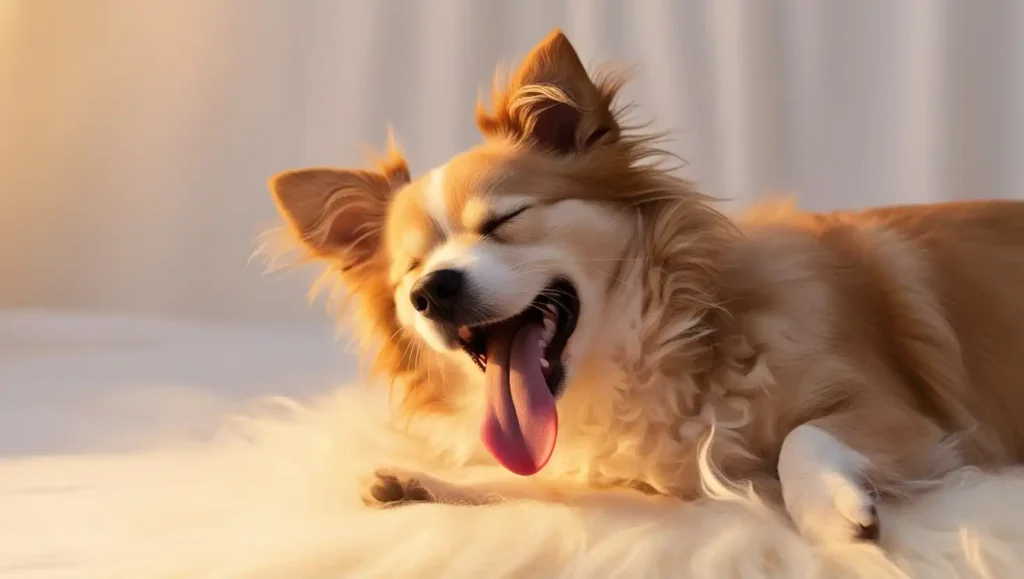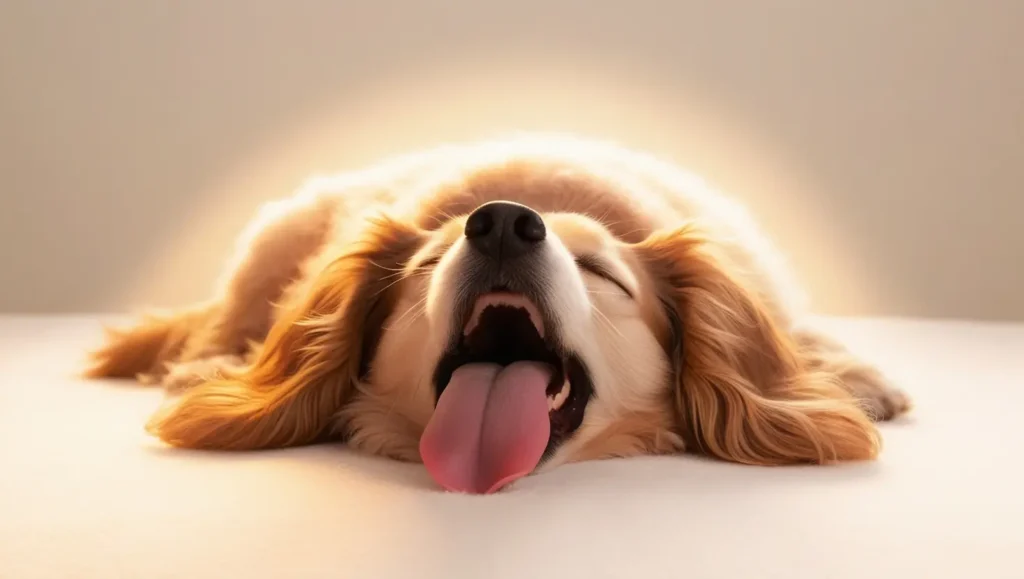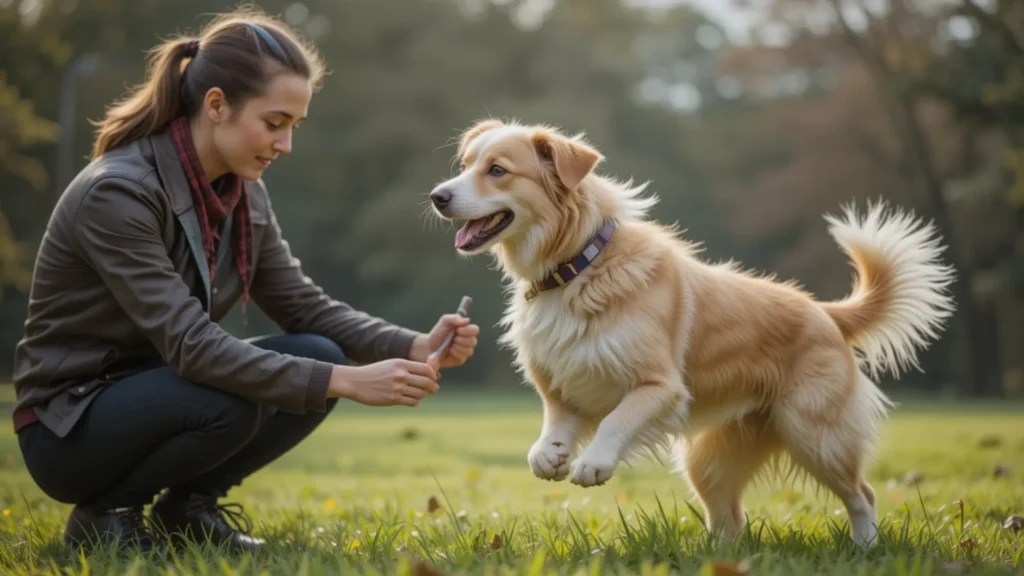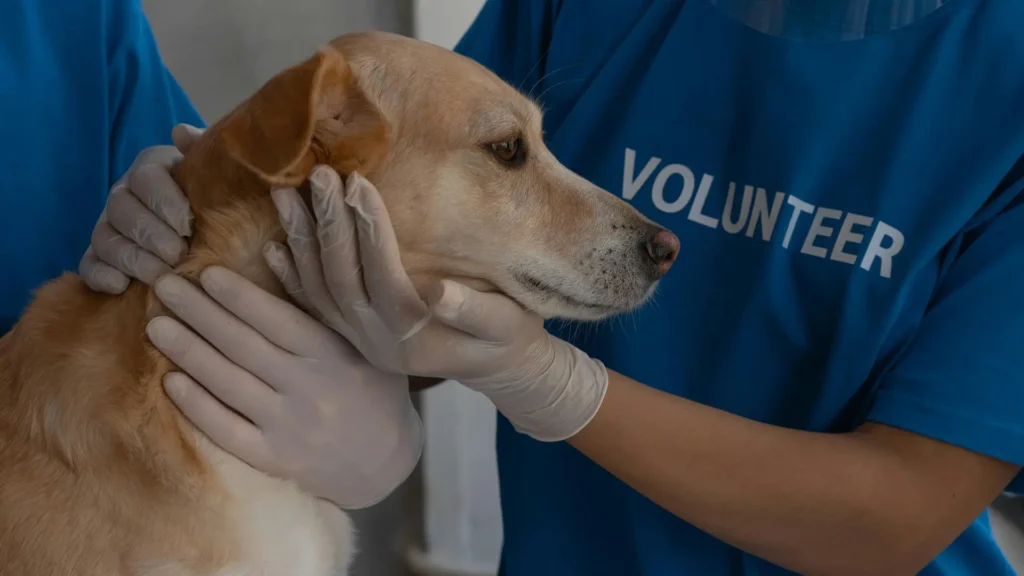Have you ever woken up in the middle of the night to hear your dog barking in their sleep? If so, you’re not alone. Many dog owners have witnessed their furry companions vocalizing, twitching, or even “chasing” something in their dreams.
While this behavior may seem strange or even concerning, barking during sleep is actually quite common and can usually be attributed to normal sleep patterns and dreaming.
In this article, we will explore the reasons behind why dogs bark in their sleep, and what you can do—if anything—to manage or prevent it.
Dogs Bark in Their Sleep Because They Dream
Like humans, dogs dream. When dreaming, dogs bark. We don’t know exactly what dogs dream about. But from our experience, we can assume that it’s likely that they are reliving experiences from their day—whether it’s playing with their favorite toy, running in the park, or interacting with other dogs or people.
Dr Deirdre Barrett, a clinical and evolutionary psychologist at Harvard Medical School explains, “Since dogs are generally extremely attached to their human owners, it’s likely your dog is dreaming of your face, your smell and of pleasing or annoying you.”
Just like humans often talk or move in their sleep when they dream, dogs may vocalize, whimper, growl, or bark as part of their dream experiences.
Dogs have sleep patterns like humans. According to a study conducted by Enikő Kovács of Eötvös Loránd University, “There are periods of wakefulness, followed by rapid eye movement (REM) sleep, and non-rapid-eye-movement sleep. In the period of REM sleep, the most memorable and vivid dreams happen.”
During REM sleep, the brain is highly active. Your dog’s body may twitch, paddle its legs, or make sounds like barking or whimpering in response to the brain’s activity. This is a normal part of the sleep cycle, and it’s a good sign that your dog is experiencing restful, regenerative sleep.
The Sleep Cycle and Its Role in Barking
The sleep cycle in dogs is similar to that of humans but is usually much shorter. According to National Sleep Foundation, “During a typical night, your sleep alternates through cycles of REM and NREM sleep about every 90 minutes.” And for dogs the sleep cycle is typically shorter, around 10–20-minute periods.
This means that your dog may enter the dreaming phase more frequently throughout the night, leading to more chances of sleep barking.
Puppies and younger dogs exhibit more pronounced sleep barking behaviors, due to their higher levels of REM sleep. Older dogs also vocalize in their sleep, but it could be due to age-related changes in their brain or nervous system.
Barking during sleep is usually most noticeable when your dog is in the active REM stage, but it can occur at any point during their sleep cycle, especially if they are dreaming about something exciting, such as chasing a squirrel or playing with a dog friend, or owner.
Excitement or Anxiety Can Amplify Sleep Barking
For some dogs, the intensity of barking during sleep may be related to their emotional state.
Dogs with high energy levels, particularly those who have not had enough physical or mental stimulation during the day, may have more active dreams, which could result in louder or more frequent barking.
Additionally, dogs with anxiety tend to vocalize during sleep. Dogs process these stressful feelings while sleeping, leading to barking, whining, or other vocalizations. Separation anxiety or fear-related stress create this type of barking at night.
An anxious dog experience restless, fragmented sleep, which lead to increased occurrences of barking. It is also possible for these dogs to experience nightmares or vivid dreams where they feel threatened, causing them to react with barking, growling, or other behaviors.
What Can You Do to Prevent Dogs from Barking in Their Sleep?

Let your dog sleep at night undisturbed. However, if their vocalizations are disruptive or seem to stem from anxiety or a lack of proper stimulation, there are several strategies you can try.
Create a Calm and Comfortable Sleep Environment
Make sure your dog’s sleeping area is as comfortable and peaceful. A quiet, dimly lit space can promote restful sleep, reducing the chances of your dog barking due to overstimulation. If you have a noisy household or your dog sleeps in a shared space, consider moving them to a quieter room, away from distractions that may trigger barking.
Some dogs need a soft bed or crate that gives them a sense of enclosure. A familiar object, like a favorite blanket or toy, can also help your dog feel comfortable and safe while they sleep.
Make Sure Your Dog Gets Enough Exercise and Mental Stimulation
Make sure to incorporate both physical and mental exercise into your dog’s daily routine. Plenty of physical exercise helps dogs to sleep better. Give your dog the proper mental enrichment throughout the day. A tired dog is more likely to fall into a deep, restful sleep with fewer interruptions or dream-induced vocalizations.
Activities like walks, runs, and playtime in the yard are great for physical exercise, while interactive toys, puzzle feeders, and obedience training provide mental stimulation. This combination can help reduce overall anxiety and restlessness, leading to calmer sleep.
Address Anxiety with Behavior Modification or Calming Aids
Address the underlying cause of sleep barking. If it is related to anxiety, address the underlying cause of that anxiety. Dogs with separation anxiety or noise phobia, for example, may experience heightened stress levels, even during sleep.
Behavioral training, positive reinforcement techniques, or calming products like Adaptil pheromone diffusers, calming collars, or anxiety wraps can help your dog feel more at ease. Consult with a veterinarian or a professional dog trainer who specializes in anxiety management.
Ignore the Barking, Unless It’s an Issue
Ignore sleep barking, if that doesn’t cause you dog any distress or discomfort. Waking your dog up or attempting to quiet them could disturb their sleep cycle, making the problem worse. Instead, allow your dog to rest undisturbed while they process their dreams.
Consult Your Veterinarian if Necessary
If your dog’s sleep barking is accompanied by other concerning behaviors, such as increased anxiety, aggression, confusion, or difficulty settling down, it may be time to consult your veterinarian. In rare cases, sleep disturbances could be a sign of a neurological issue or sleep disorder that requires professional attention.
Your veterinarian may recommend diagnostic tests or refer you to a veterinary behaviorist to better understand your dog’s sleep patterns and provide the appropriate treatment plan.
Conclusion
In most cases, barking during sleep is a normal and harmless behavior that reflects your dog’s vivid dream life. Just as humans sometimes talk or move in their sleep, dogs will vocalize, bark, or twitch while dreaming. If the barking is infrequent and doesn’t seem to cause distress, there’s no need to worry.




